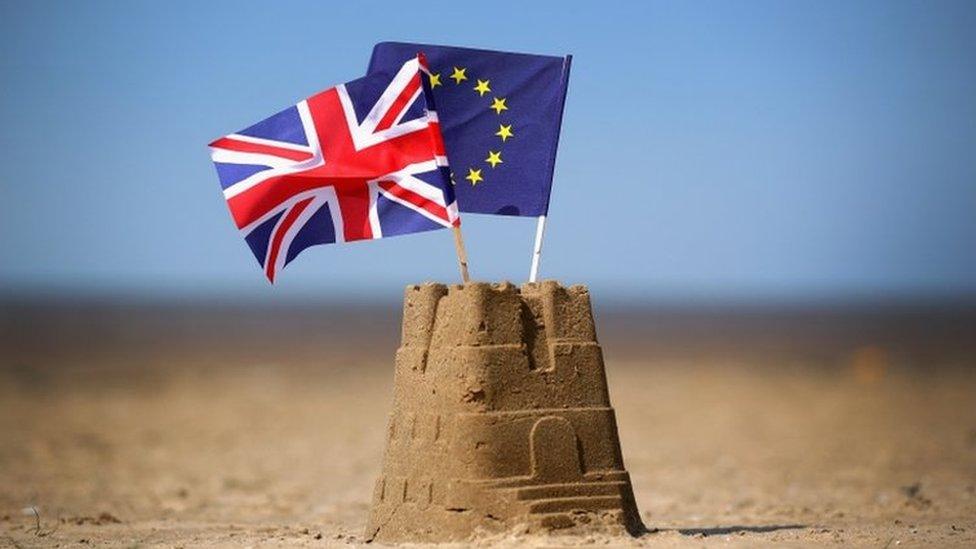Brexit - and stay in the single market? Here's how
- Published
- comments

Free movement of people is a fundamental principle of the European Union single market.
It is the right of any EU citizen to seek work in any other country in the EU.
And it is non-negotiable.
If you want to be in the single market - and, as most economic authorities' judge, therefore gain economically - then you have to allow EU citizens to work in the UK.
If Britain votes to leave the EU on June 23, many believe that would not only end free movement of people (a central tenet of the Leave campaign's offer to voters) but also end the UK's membership of the single market.
Today, Wolfgang Schaeuble, the German finance minister, appeared to say as much - a vote for Brexit is also a vote for leaving the single market, and all its advantages.
"If the majority in Britain opts for Brexit, that would be a decision against the single market," Mr Schaeuble told Der Spiegel.
"In is in. Out is out. One has to respect the sovereignty of the British people."
For some business leaders sympathetic to Brexit - and close to the Prime Minister - this is a problem.
They agree that leaving the single market could result in significant economic headwinds.
But, they tell me, there is a solution - the UK remaining in the single market but without the need for full free movement as presently constituted.
And they are in discussions with German businesses to make the case for a different structure if the vote goes their way.
It would work like this:
Britain votes to leave the EU.
Negotiations begin on Britain's new relationship with the EU.
The UK offers to maintain at least part of its contribution to the EU budget - at present about £8.5bn a year including rebates and EU support for British agriculture and research.
In return, Britain withdraws from the free movement of people requirements but allows for a lesser "free movement of labour" which allows for workers from the EU to come to the UK with a firm job offer.
One senior City figure I spoke to who is pro-Brexit said that German businesses were "petrified" of the UK leaving the single market.
He argued that "Mittelstand" firms - the medium sized companies that are the engine room of the German economy - would demand that political leaders do a deal to allow goods unfettered access to the UK.
And vice versa.
Other EU countries are also concerned about the economic effect on their domestic economy if the UK leaves, and, those sympathetic to Brexit believe, politicians would be under similar business pressure to "do a free trade deal".
A little noticed study in the Netherlands by the country's Bureau for Economic Analysis, external said this: "By 2030, the costs for the Netherlands [of Brexit] could run up to 1.2% of GDP, or 10 billion euros.
"And, if we also assume innovation is trade‐induced as recent examples in the literature have shown, then the Brexit‐related costs of 10 billion euros could increase by another 65%."
The report suggests that if the UK does vote to leave there would need to be some form of free trade agreement, although not with all the advantages of the present single market.
"It would not be able to completely restore the current full access to the internal market," the report says.
"[But] should the EU and the UK reach a free trade agreement, the economic consequences of a Brexit for the Netherlands would be reduced by 20% [in the] absence of trade tariffs for goods traded between the EU and the UK."
The Remain campaign is dismissive of the chances of Britain leaving the EU but staying, at least partially, in the single market.
But business leaders that back Brexit are not so sure.
The economic needs of businesses in the rest of the EU may force the hand of political leaders.